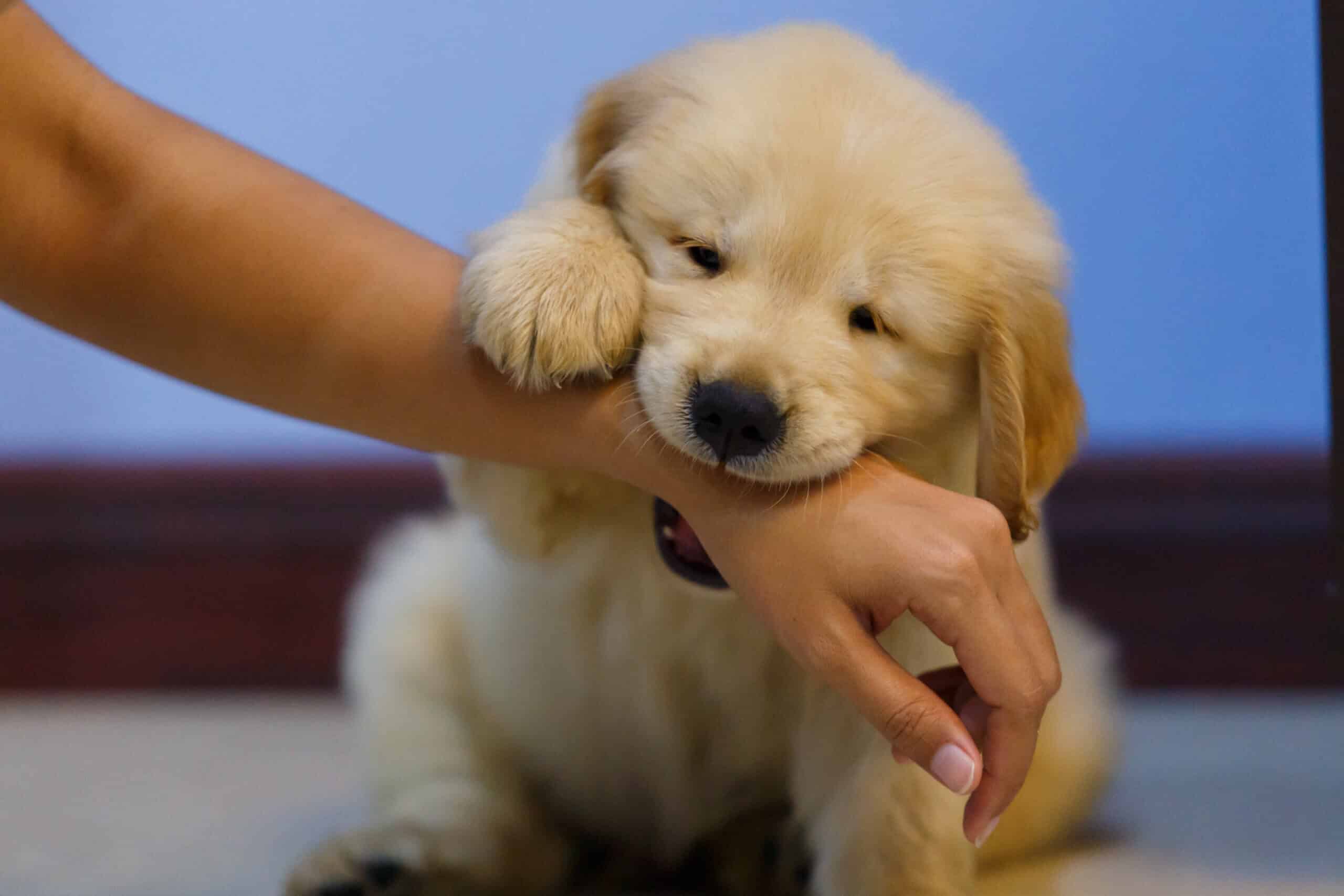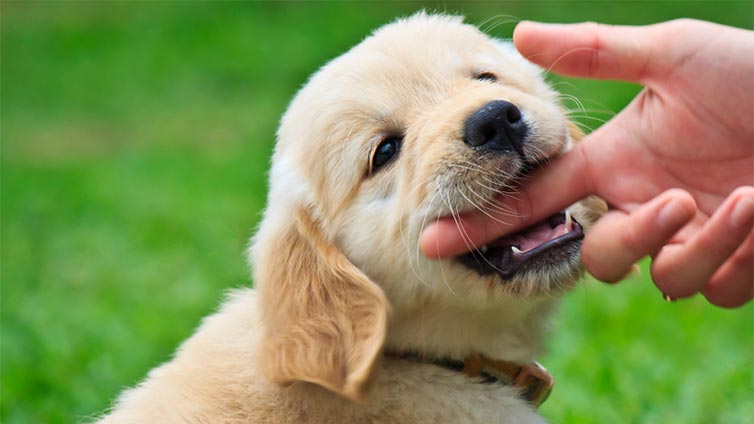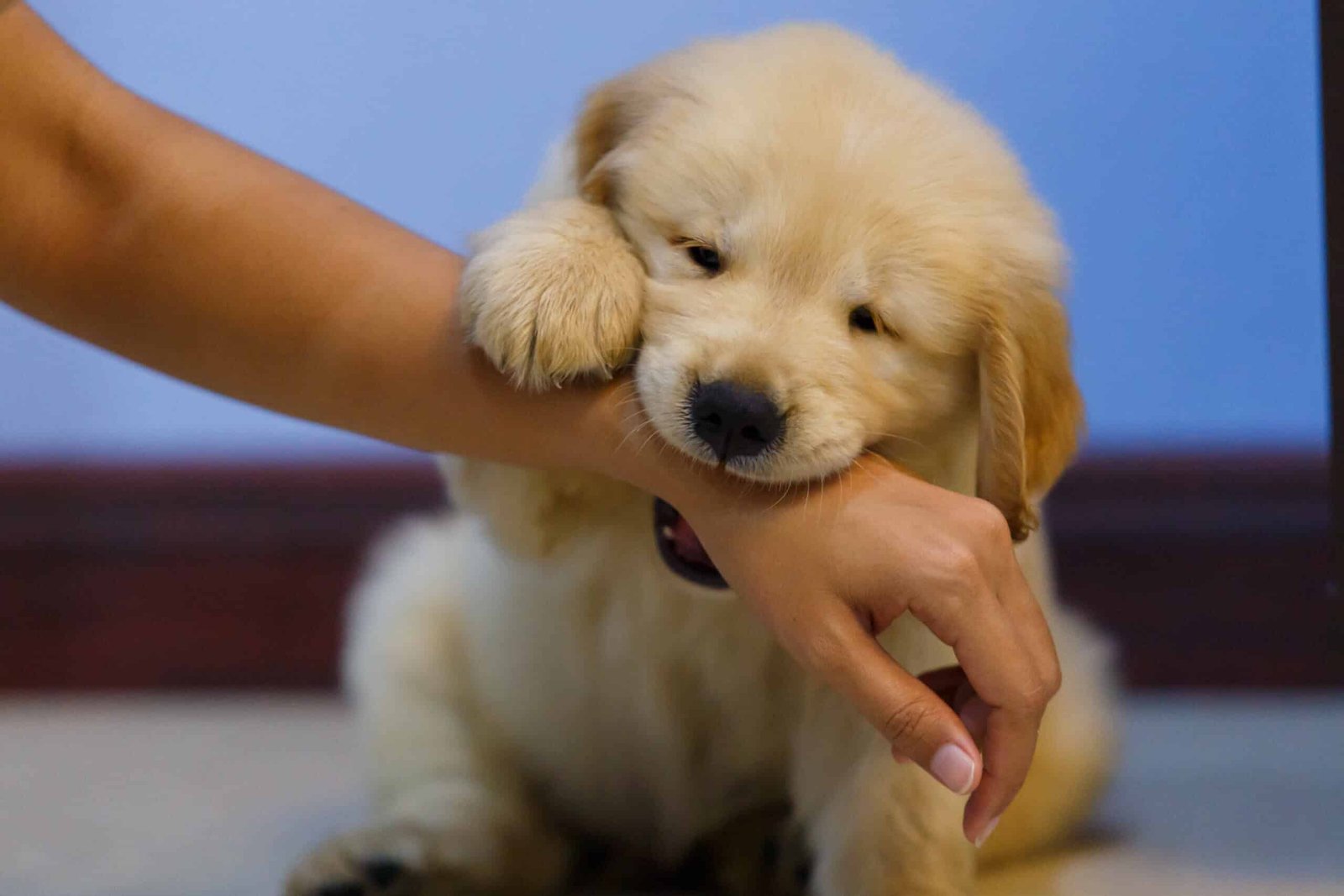Introduction:
When does a golden retriever stop biting? It’s a question that many new pet owners ask. We all love those adorable golden retriever puppies, but their biting behavior can sometimes be overwhelming. Don’t worry, though – I’m here to give you the lowdown on when you can expect those sharp little teeth to calm down.
So, let’s get started and find out when your golden retriever will stop their biting frenzy. puppies go through a critical teething phase, where biting and chewing are natural behaviors. Training and socialization play a crucial role in teaching them the appropriate way to use their mouth.
But here’s the good news: as your golden retriever grows older and matures, their biting behavior should gradually decrease. By implementing consistent training methods and providing them with appropriate chew toys, you’ll see those biting incidents become less frequent and intense.

When Does a Golden Retriever Stop Biting?
Golden Retrievers are lovable and friendly dogs known for their gentle nature. However, like all puppies, they go through a biting phase as they explore their world and develop their teeth and jaws. It’s important for owners to understand when this behavior is typical, when it may become a problem, and how to address it effectively. In this article, we will delve into the topic of when a Golden Retriever stops biting and provide valuable insights for dog owners.
The Biting Phase: Understanding Your Golden Retriever Puppy
Golden Retriever puppies start biting at an early age as part of their natural development. Just like human babies, they explore the world around them through their mouths. Their baby teeth start to erupt around three to six weeks of age, and as they continue to grow, the puppy’s instinct to chew and bite becomes stronger. This biting phase is completely normal and expected during the early months of a Golden Retriever’s life.
During this biting phase, puppies learn important lessons about bite inhibition, socialization, and dominance within their litter. They also learn to control the pressure of their bites through interactions with other puppies. It’s crucial for the puppies to have appropriate opportunities to practice this behavior in a controlled environment, as it helps build important social and communication skills that will shape their behavior as adults.
As a responsible owner, you play a significant role during this phase. It’s important to recognize that biting is a natural behavior for puppies and to be patient and consistent when teaching them the appropriate ways to interact with people and other animals. Understanding the biting phase and its duration is the first step in effectively managing this behavior.
When Does the Biting Phase Typically End?
The biting phase in Golden Retrievers typically lasts from three to six months of age. However, it can vary from one puppy to another. Some puppies may show signs of reduced biting earlier, while others may continue to bite until they are seven or eight months old. It’s important to remember that the duration of the biting phase is influenced by several factors, including genetics, socialization, and training methods.
By the time Golden Retrievers reach six months of age, the majority should have gone through the worst of the biting phase. However, occasional instances of biting may still occur, especially in response to exciting or stressful situations. It’s crucial for owners to continue reinforcing bite inhibition, socialization, and appropriate behavior even after the initial biting phase ends. Consistency and positive reinforcement training methods are key to ensuring that your Golden Retriever grows into a well-behaved and gentle adult dog.
In summary, most Golden Retriever puppies will stop biting between three to six months of age. However, it’s important to note that each puppy is unique, and their individual learning process may vary. Patience, consistency, and gentle guidance are key in helping your Golden Retriever navigate through this developmental phase.
Dealing with Biting: Tips for Owners
While the biting phase is a natural part of a Golden Retriever’s development, it’s important to address this behavior to prevent any potential problems in adulthood. Here are some tips to help you effectively manage and reduce biting in your Golden Retriever puppy:
1. Provide Appropriate Chew Toys
Golden Retrievers have a strong instinct to chew, so it’s essential to offer them appropriate chew toys to redirect their biting behavior. Look for sturdy toys specifically designed for teething puppies. These toys help soothe their gums and provide them with a suitable outlet for their urge to chew.
2. Use Positive Reinforcement Techniques
Positive reinforcement is a powerful tool in training your Golden Retriever to stop biting. Rewarding your puppy for calm behavior and for choosing appropriate chew toys instead of hands or furniture reinforces positive habits. Be consistent in praising and rewarding your puppy when they make the right choices.
3. Teach Bite Inhibition
Teaching bite inhibition is crucial during the biting phase. When your puppy bites too hard during play or accidentally nips, let out a yelp to mimic the response of another puppy. This will startle your puppy and help them understand that their bite was too strong. Immediately redirect their attention to an appropriate chew toy and praise them for chewing on it instead.
4. Socialize Your Puppy
Proper socialization is essential for a well-rounded Golden Retriever. Expose your puppy to a variety of people, animals, and environments to help them learn appropriate behavior and build their confidence. Positive experiences during socialization can help reduce anxiety and prevent aggressive behaviors, including excessive biting, in the future.
5. Seek Professional Help if Needed
If your Golden Retriever continues to display excessive or aggressive biting behavior even after the typical biting phase, it may be beneficial to consult with a professional dog trainer or behaviorist. They can assess the situation and provide customized guidance and training techniques to address the behavior effectively.
Remember, addressing biting behavior in Golden Retrievers requires patience, consistency, and a calm approach. With proper guidance and training, you can help your Golden Retriever grow into a well-behaved and gentle companion.
The Importance of Early Training and Socialization
Early training and socialization play crucial roles in shaping a Golden Retriever’s behavior and temperament. By starting training and socialization from an early age, you can help your puppy develop appropriate bite inhibition, social skills, and manners. Here are some key benefits of early training and socialization:
1. Prevention of Behavior Issues
Proper training and socialization help prevent behavior issues such as excessive biting, aggression, and anxiety. By exposing your puppy to different situations, people, and animals, you can help them become comfortable and confident in various environments.
2. Strengthening the Bond
Training sessions provide an opportunity for you to bond with your Golden Retriever. Through positive reinforcement techniques, you establish a trusting relationship built on mutual respect and clear communication. This bond will contribute to a well-behaved and obedient dog.
3. Improved Safety
A well-trained and socialized Golden Retriever is less likely to get into dangerous or potentially harmful situations. They will respond reliably to commands and be less likely to engage in risky behaviors, such as excessive biting or chasing after other animals.
Conclusion
While the biting phase in Golden Retrievers is a normal part of their development, it’s important for owners to understand when this behavior is typical and when it may become a problem. Most Golden Retriever puppies will stop biting between three to six months of age, but the duration can vary. Patience, consistent training, and positive reinforcement techniques are key to helping your puppy navigate through this biting phase. By providing appropriate chew toys, using positive reinforcement, teaching bite inhibition, socializing your puppy, and seeking professional help if needed, you can effectively manage and reduce biting behavior in your Golden Retriever. Remember, early training and socialization are essential in shaping a well-behaved and gentle adult dog. Start training and socializing your Golden Retriever as early as possible to prevent behavior issues and strengthen your bond.
Key Takeaways: When Does a Golden Retriever Stop Biting?
- A golden retriever typically stops biting as it matures, usually between 6 and 8 months old.
- Proper training and socialization can help reduce biting behavior in golden retrievers.
- Redirecting their biting onto appropriate chew toys can teach them what is acceptable behavior.
- Consistency and positive reinforcement are key in stopping biting habits in golden retrievers.
- If biting behavior persists or becomes aggressive, seeking the help of a professional dog trainer is recommended.
Frequently Asked Questions
Are you wondering when a golden retriever stops biting? Here are some commonly asked questions about this behavior and the answers to help you understand when and how it typically resolves.
1. How long do golden retrievers bite?
Golden retrievers are playful and curious puppies, and biting is a common behavior during their teething stage. This stage usually lasts from three to six months. While some puppies may stop biting sooner, others may take longer. Consistency in training and providing appropriate chew toys can help redirect their biting behavior and speed up the process of them learning to control their bite force.
It’s important to remember that while biting is normal during the teething stage, it should gradually decrease as the puppy grows older. If the biting behavior persists beyond six months or becomes aggressive, it is advisable to consult a professional dog trainer or behaviorist for guidance.
2. How can I prevent my golden retriever puppy from biting?
Preventing biting in golden retriever puppies involves a combination of training techniques and providing appropriate outlets for their biting instincts. Firstly, it’s crucial to discourage rough play and avoid any actions that may encourage biting, such as playing tug-of-war or wrestling with your hands. Instead, offer them safe chew toys and redirect their attention to those whenever they start to bite.
Consistent training is key. Teaching the “leave it” and “drop it” commands can be helpful in redirecting their focus away from biting. Positive reinforcement, such as rewarding and praising them when they chew on their toys instead of biting humans, can also encourage the desired behavior. Patience and consistency in training will ultimately help your golden retriever puppy learn appropriate bite inhibition.
3. Is it normal for a golden retriever to bite during playtime?
During playtime, it is normal for golden retrievers to display mouthing behaviors, which may involve gentle or inhibited biting. This behavior is a way for puppies to explore the world around them and communicate with their littermates or humans. As long as the biting is gentle and does not cause harm, it is considered part of normal play behavior.
However, it’s important to set boundaries and teach your golden retriever appropriate play manners to prevent this behavior from escalating into excessive biting or aggression. Consistent reinforcement of positive play behavior and redirecting their attention to toys can help establish those boundaries and teach them to engage in play without biting excessively.
4. My golden retriever still bites even after the teething stage. What should I do?
If your golden retriever continues to bite after the teething stage (around six months), it may indicate a need for further training and behavior modification. Seeking the guidance of a professional dog trainer or behaviorist is highly recommended in such cases. They can help assess the underlying reasons for the biting and provide specific training techniques to address the behavior.
It’s essential to rule out any potential medical issues that could be causing discomfort or pain, leading to increased biting tendencies. A thorough examination by a veterinarian is advisable to ensure there are no underlying health concerns contributing to the biting behavior.
5. At what age does a golden retriever puppy typically stop biting?
Golden retriever puppies typically stop biting as they mature and reach adolescence/adulthood, which is around 12 to 18 months of age. By this time, they have usually outgrown their teething phase, and with consistent training and socialization, they learn to control their biting impulses.
Keep in mind that each golden retriever is unique, and individual differences in temperament and behavior may influence when they fully stop biting. Patience, consistent training, and positive reinforcement are key factors in helping your golden retriever develop appropriate bite inhibition and grow into a well-behaved adult dog.

Summary
If you have a golden retriever and wonder when they’ll stop biting, here’s what you need to know. Golden retrievers usually stop biting around four to six months of age. It’s a normal part of their puppy development and they will learn bite inhibition with time. It’s important to redirect their biting behavior to appropriate chew toys and provide consistent training and socialization to help them learn good manners. Remember, patience is key when it comes to teaching your golden retriever to stop biting.
So, if your golden retriever is still biting after six months, it’s essential to seek help from a professional dog trainer. They can provide you with guidance and training techniques to address the biting behavior. In the meantime, continue to provide your golden retriever with plenty of positive reinforcement, love, and patience. Soon enough, they will grow out of their biting phase and become a well-behaved companion.
